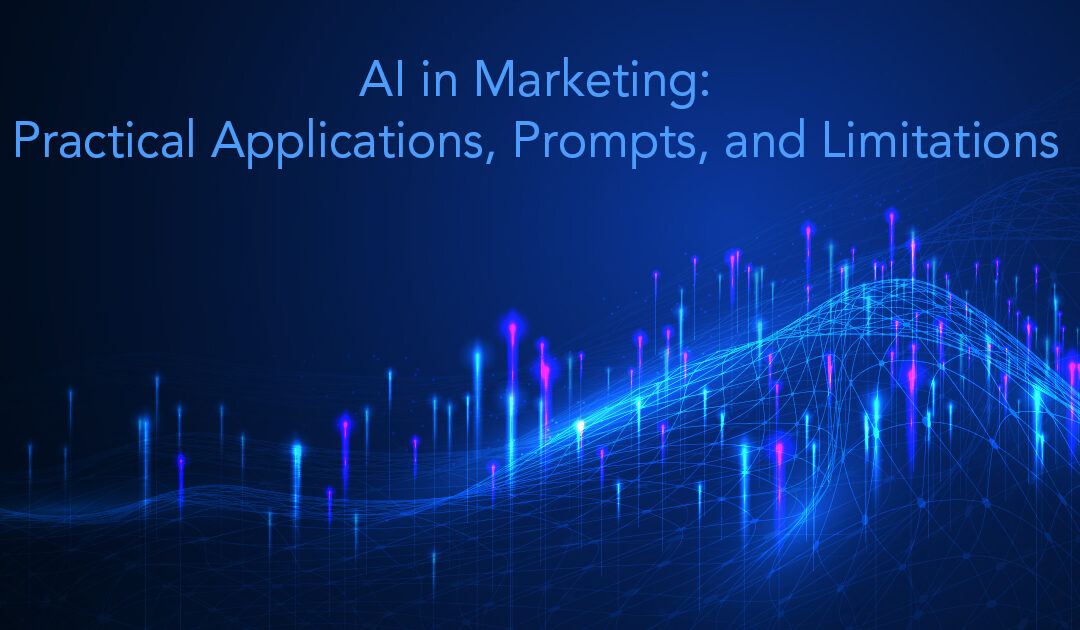
by Lori Berson | Jul 1, 2024 | AI, artificial intelligence, Marketing, Marketing Strategy
Artificial Intelligence (AI) is revolutionizing every aspect of marketing, offering a range of practical applications that can streamline processes, enhance personalization and customer engagement, and improve decision-making. However, it’s essential to understand both the benefits and limitations of AI to leverage its full potential effectively. Below are some of the practical applications of AI in marketing and the constraints to be aware of.
Practical Applications
- Data Cleaning
AI tools can automate the process of cleaning and organizing large datasets, ensuring accuracy and reliability for analysis.
Prompt: “Clean and standardize this dataset of customer contact information, removing duplicates and formatting inconsistencies.“
-
Accelerating Creativity and Ideation
AI can help brainstorm ideas for content, ad campaigns, and more, providing fresh perspectives and reducing creative blocks.
Prompt: “Provide five unique content ideas for a social media campaign promoting [product or service].”
-
Personalized Outreach
AI enables personalized email marketing campaigns by analyzing customer data to tailor messages.
Prompt: “Create a personalized email template for customers who have abandoned their shopping carts.”
-
Refreshing Content
AI can update and repurpose existing content to keep it relevant and engaging.
Prompt: “Revise this two-year-old blog post to include the latest 2024 industry trends and data.”
- Sentiment Analysis
AI tools can analyze customer feedback and social media posts to gauge public sentiment toward a brand or product.
Prompt: “Analyze the sentiment of these customer reviews and summarize the overall customer perception for our latest product release.”
-
Chatbots
AI-powered chatbots can handle customer inquiries, provide support, and enhance user experience on websites.
Prompt: “Set up a chatbot script to handle common customer service questions about shipping and return policies.”
-
Meeting Note Transcriptions
AI can transcribe and summarize meeting notes, making information easily accessible and actionable.
Prompt: “Transcribe and summarize the key points from this marketing team meeting recording.”
-
Video and Audio Editing
AI tools can edit video and audio files, adding effects, transitions, and enhancements quickly and efficiently.
Prompt: “Edit this video footage to create a 30-second promotional clip, including background music and captions.”
Prompting Tips
- Explain the task or problem as you would to a person. Treat AI as your assistant.
- Use examples to illustrate what you want.
- Give the model a “role” and tell it about your target audience.
- For detailed prompting tips, download our Prompting Frameworks.
Limitations of AI
- Factual Accuracy
- High-Level Strategy
- Reasoning and Logic
- Understanding Context
- Handling Uncommon Scenarios
- Humor
- Emotional Intelligence
- Consistency
- Representing Marginalized Groups
- Privacy
While AI is good for routine, repetitive, and data-driven tasks, it lacks the creativity, experience, and perception required to develop and implement viable, successful marketing experiences. Effectively using AI is all about balance; balance between the integration of AI and the experience and know-how of marketing professionals.
BersonDeanStevens (BDS) has been developing results-driven marketing strategies, content, campaigns, and programs for over 25 years. And, we bring the knowledge and expertise to incorporate AI when necessary to gain efficiencies and help boost results.
Whether you’re looking for a fractional CMO, need assistance when your internal workforce is overloaded, or need consulting from time to time, BDS is the perfect go-to resource.
Ready to take your marketing to the next level with AI? To get started, schedule a call or email Lori at lberson@BersonDeanStevens.com.
BersonDeanStevens has been a recognized brand strategy and marketing leader for over 25 years. We work in partnership with you to differentiate your brand and achieve your business goals. Client list.
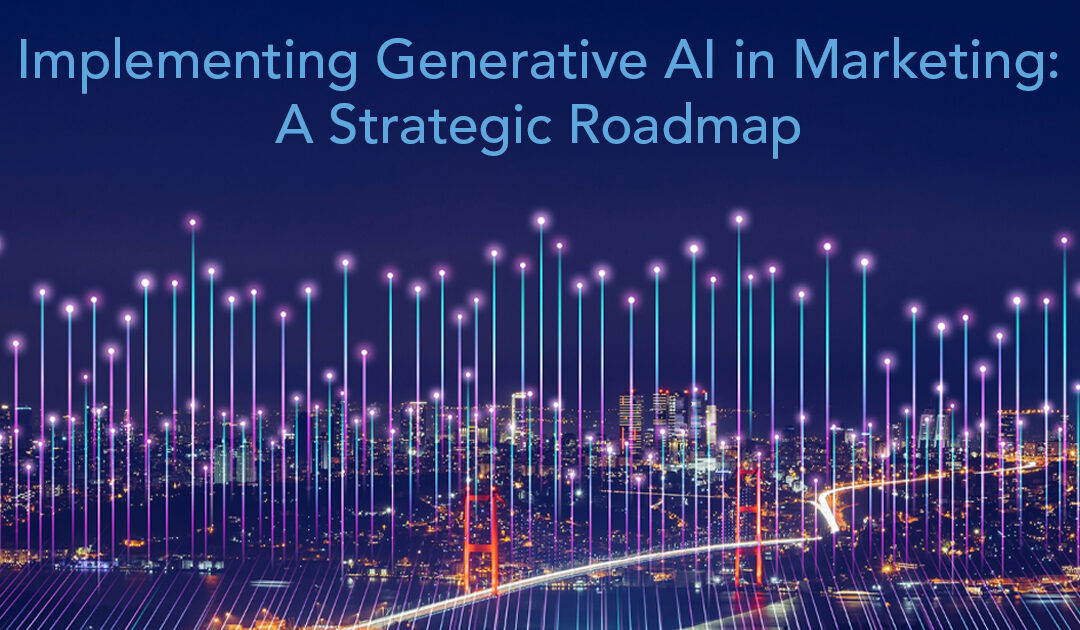
by Lori Berson | May 29, 2024 | AI, artificial intelligence, Marketing, Marketing Strategy
Generative AI (GenAI) is quickly transforming marketing, enabling content creation, decision automation, and data-driven insights. Adopting it promises competitive advantages, as major companies actively explore and implement GenAI solutions. However, realizing GenAI’s full potential requires a strategic, well-planned implementation approach. Here are several key considerations to keep in mind.
Assess Your Readiness
Before adopting GenAI, honestly evaluate if your organization is ready. This goes beyond just having the technology. Your use of GenAI must align with your overall business goals. Do you have enough staff and funding? Are roles and processes clearly defined? Many companies lack combined AI and marketing expertise, so you may need to bring in outside talent.
Build a Data-Driven Culture
GenAI relies on high-quality data for accurate outputs. Companies should develop strong data practices around governance, quality control, and privacy. Treating data as a strategic asset, rather than an afterthought, will pay off for GenAI and overall decision-making. A comprehensive data strategy is essential.
Tailor Use Cases
Don’t just adopt generic GenAI solutions. Identify your real marketing needs that GenAI can address. Get input and buy-in from employees across different teams. Use cases should be customized to your unique challenges and opportunities. Make sure to gather continuous feedback and maintain transparent ethical standards when building solutions.
Plan for Scalability
While pilot projects prove concepts, GenAI’s true value comes from wide-scale deployment across the organization. Market leaders get more productivity, quality, and creativity gains from scalable implementations. Design your use cases to smoothly integrate into all marketing operations. Robust change management prepares everyone for the transformation.
Manage Risks
GenAI introduces new risks around compliance and cybersecurity. You should adhere to AI governance frameworks like NIST’s AI RMF and the EU AI Act. And implement “security-by-design” via practices like penetration testing to address AI’s unique cybersecurity risks.
Assess Expertise
GenAI’s implementation requires skills that blend AI and data science with deep marketing know-how. Since this skill set remains scarce, companies should supplement staff with fractional or contract marketing experts who can provide specialized leadership and cross-functional guidance throughout the implementation journey.
With careful strategy and preparation, GenAI can drive innovation, operational efficiencies, and a sustained competitive advantage. Those who get it right will be well-positioned to thrive in this exciting new era of data-driven, AI-enabled marketing.
Ready to integrate AI into your marketing? To get started, download our tip sheets and schedule a call or email Lori at lberson@BersonDeanStevens.com.
BersonDeanStevens has been a recognized brand strategy and marketing leader for over 25 years. We work in partnership with you to differentiate your brand and achieve your business goals. Client list.

by Lori Berson | Apr 16, 2024 | AI, artificial intelligence, Data, Marketing Strategy
Marketing’s measure of success is often boiled down to a single metric: Return on Investment (ROI). However, recent research commissioned by Iterable and conducted by Wakefield Research, and published by Ad Age, suggests a shift in how marketers perceive ROI from investments in Artificial Intelligence (AI).
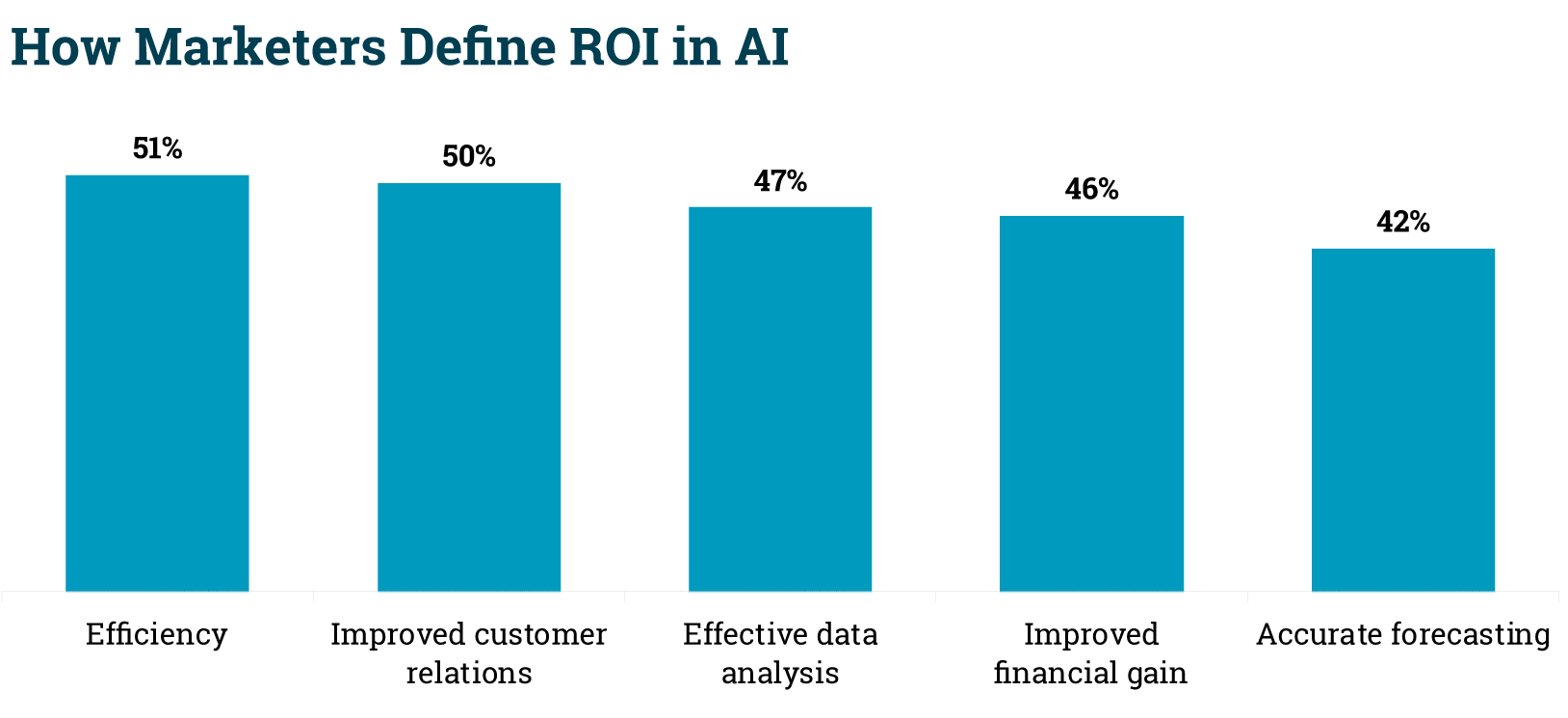
Efficiency and Customer Relations: The New ROI Drivers
Unlike traditional views that align ROI directly with financial gain, today’s marketers are increasingly valuing efficiency and improved customer relations as primary indicators of ROI in AI initiatives. The study reveals that 51% of marketers define ROI through the lens of efficiency gains, underscoring AI’s role in streamlining operations and enhancing productivity. Furthermore, 50% of marketers connect ROI with the improvement of customer relationships, highlighting the potential of AI to personalize customer interactions and allow for deeper connections.
Data Analysis and Forecasting: Enhancing Decision Making
While financial gains are still significant, with 46% of marketers linking ROI to improved financial outcomes, there’s a noticeable shift towards valuing the strategic advantages of AI beyond direct monetary returns. Additionally, 42% of marketers see the value of AI in providing accurate forecasting, which can be pivotal in strategic decision-making.
Marketers’ Adoption and Attitudes Towards AI
With 91% of surveyed marketers already using AI technologies, the perception of AI as a transformative force rather than just a tool is gaining traction, yet only 37% see it as an essential skill they must master, despite widespread concern about keeping up with technological advancements.
The Future of AI in Marketing: Opportunities and Challenges
This shift in perspective is not just theoretical. Marketers report that AI contributes to better job performance and operational efficiency. Most believe AI opens doors to new positions rather than replacing jobs, with 69% viewing AI as a creator of opportunities.
The shift in ROI measurement underscores a broader transition in marketing—from a purely financial focus to a multi-dimensional strategy that includes efficiency, customer relationships, and data-driven decision-making. As AI technologies continue to advance, their role in reshaping marketing strategies and defining new success metrics will undoubtedly expand, offering both challenges and opportunities for marketers aiming to stay ahead in their fields.
About the Data: The results are based on a September 2023 survey of 1,200 marketers.
For help infusing AI into your workflows, schedule a call or email Lori Berson at lberson@BersonDeanStevens.com.
BersonDeanStevens has been a recognized brand strategy and marketing leader for over 25 years. We work in partnership with you to differentiate your brand and achieve your business goals. AI use cases and client list.
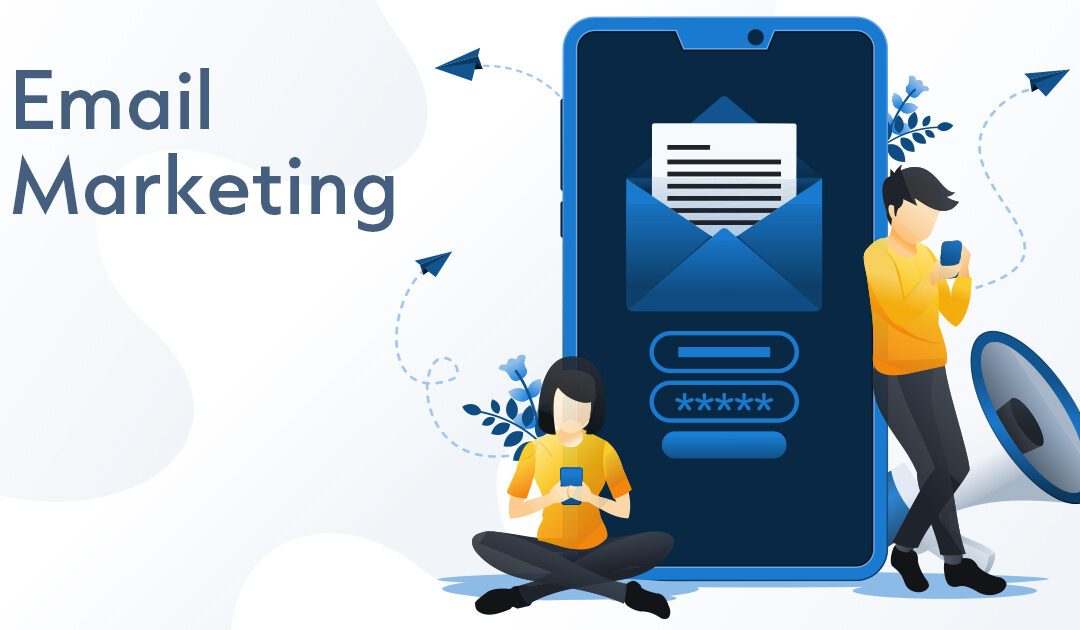
by Lori Berson | Apr 3, 2024 | Email Marketing, Marketing
Email marketing remains a vital tool for businesses aiming to connect with their audience. However, the effectiveness of this tool is significantly influenced by how businesses choose to use artificial intelligence (AI) and personalization tactics. A recent Litmus report in partnership with Oracle provides an overview of the current landscape and the opportunities available with email marketing, revealing some insightful trends.
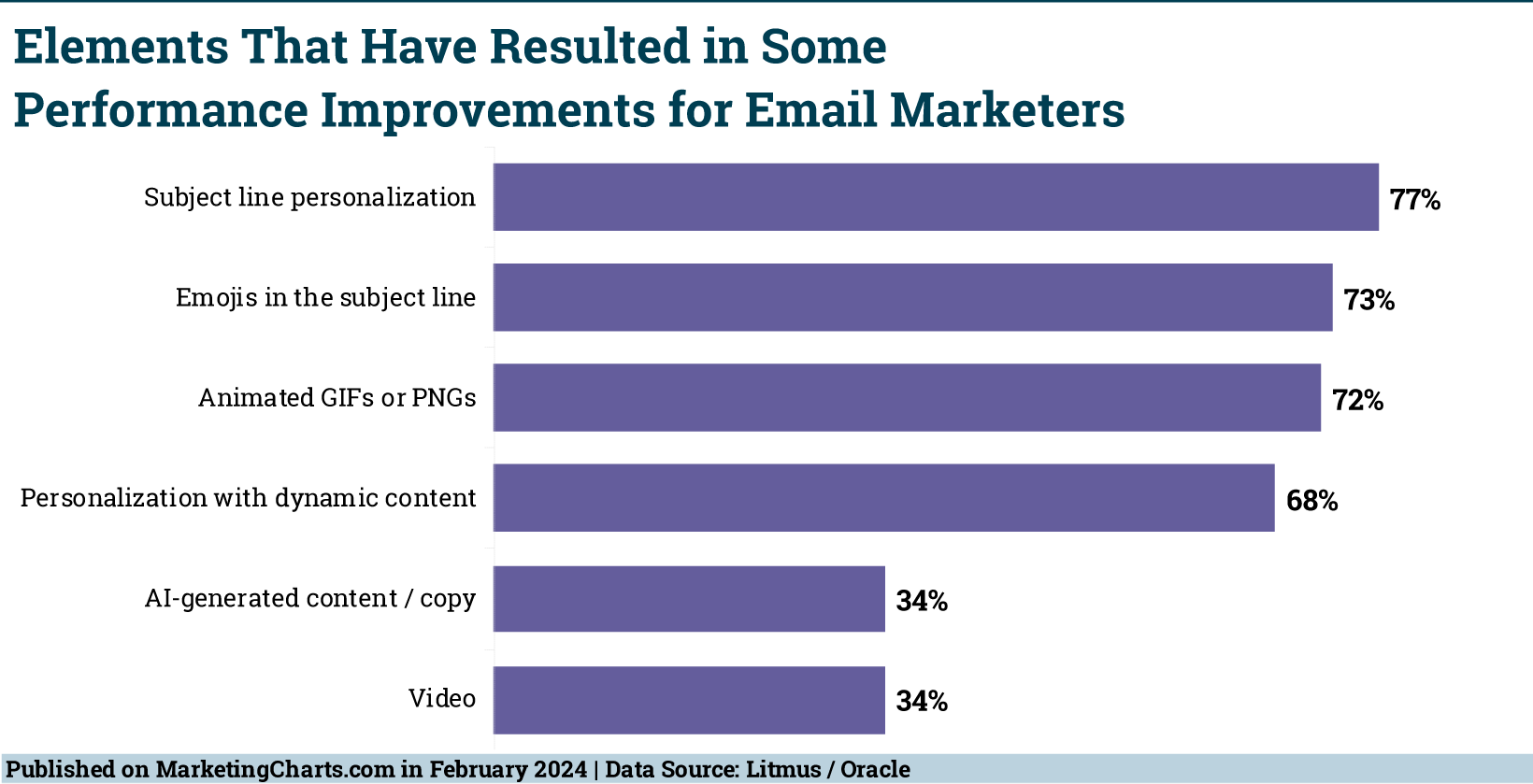
AI in Email Marketing: Underused Yet Potentially Transformative
AI-generated content and copy in email marketing, despite being a common use case, surprisingly ranks low in contributing to campaign performance improvements. This apparent underutilization is not a reflection of AI’s potential but rather indicates a nascent stage of adoption. With only one-third of marketers reporting a boost in email performance due to AI-generated content, it’s clear that those who have used generative AI are reaping significant benefits. This scenario presents a compelling opportunity for businesses to explore AI’s capabilities further and integrate them into their email marketing strategies.
The Unrivaled Impact of Personalization and Segmentation
The report highlights two critical tactics that overwhelmingly improve email marketing performance: subject line personalization and the use of emojis. An impressive 77% of email marketers have found that personalizing subject lines enhances campaign effectiveness, while 73% credit emojis with boosting performance. This data underscores the importance of crafting engaging and tailored content that resonates with the recipient, making the email more than just another message in their inbox but a personalized communication that captures their attention.
Beyond subject lines, personalization extends into the content of the emails themselves. Dynamic content, tailored to the recipient’s preferences and behaviors, has significantly increased click-through rates. This level of customization demonstrates a deep understanding of the target audience, making for a stronger connection between the brand and its customers.
Furthermore, an overwhelming 90% of surveyed email marketers acknowledged that segmentation plays a pivotal role in enhancing campaign performance. By dividing their audience into distinct groups based on specific criteria, marketers can deliver more relevant and impactful messages, thereby increasing engagement and conversion rates.
A Call to Action
The insights from the Litmus and Oracle report serve as a compelling call to action for email marketers. In an age where consumers are bombarded with digital communications, the ability to stand out through personalized, engaging, and AI-enhanced content is more crucial than ever. As email marketing continues to evolve, businesses must stay updated on these trends and leverage them to create meaningful connections with their audience. By prioritizing personalization, segmentation, and the strategic use of AI, marketers can transform their email campaigns into powerful tools for building lasting relationships and driving business success.
About the Data: The results are based on an October and November 2023 survey of more than 480 email marketers worldwide.
For help with your email marketing, schedule a call or email Lori Berson at lberson@BersonDeanStevens.com.
BersonDeanStevens has been a recognized brand strategy and marketing leader for over 25 years. We work in partnership with you to differentiate your brand and achieve your business goals. Client list.

by Lori Berson | Feb 13, 2024 | AI, artificial intelligence, Marketing, Marketing Strategy
In the rapidly evolving world of marketing, artificial intelligence (AI) has emerged as a powerful tool, offering unprecedented capabilities to businesses aiming to enhance their content creation and overall marketing strategies. However, it’s crucial to acknowledge that AI, despite its advanced capabilities, is not a cure-all or magic bullet. It’s a tool that needs a well-thought-out marketing strategy to create transformative content.
AI offers the potential to generate content at scale, analyze data, automate tasks, and personalize marketing efforts in ways previously unimaginable, but AI-generated content requires human direction, input, expertise, and editing. In and of itself, AI content is not always correct, often over-written and not written in context. To be successful with AI, you need someone driving the process.
At BersonDeanStevens (BDS), we understand the delicate balance between leveraging cutting-edge AI technologies and maintaining the human touch that is fundamental to creating marketing content that resonates with your audience. With over 25 years of experience in developing results-driven content, campaigns, and programs, BDS brings a wealth of knowledge and expertise to incorporate AI to boost results.
Whether you are looking for an ally to handle strategic content creation, help train your team on the proper use of AI, or need consulting from time to time, BDS is your go-to resource.
For help with AI and how to successfully integrate it into your business, schedule a call or email Lori Berson at lberson@BersonDeanStevens.com.
BersonDeanStevens has been a recognized brand strategy and marketing leader for over 25 years. We work in partnership with you to differentiate your brand and achieve your business goals. Client list.

by Lori Berson | Jan 11, 2024 | AI, artificial intelligence, Marketing, Marketing Strategy
Staying ahead of the marketing curve is not just an advantage, but a necessity – especially with Artificial Intelligence (AI). Below are just a few examples (and tools) of how AI can elevate every aspect of a marketing campaign, from targeted planning to insightful post-campaign analysis.
The integration of AI in marketing goes beyond automation. It’s a fundamental shift in how we conceptualize and execute marketing strategies. AI offers unparalleled efficiency, personalization, and scalability in campaigns, setting a new benchmark in marketing excellence.
Tailoring Campaigns with Precision: The Pre-Campaign Stage
AI-Driven Audience Targeting
AI’s capability to analyze and interpret complex data sets enables marketers to identify and target the most receptive audiences. This allows for highly targeted marketing campaigns that speak directly to the needs and interests of your audience.
Content Creation
Imagine a creative assistant that helps generate ideas, themes, and content. AI aids in creating diverse and appealing marketing materials, ensuring your message is both engaging and relevant.
Campaign Planning
AI tools can assist in campaign planning by predicting market trends and customer behavior, allowing marketers to stay ahead of the curve.
Engaging Customers: The Active Campaign Stage
Enhancing Customer Interaction
AI can personalize customer interactions by analyzing past behavior and preferences. This results in more engaging and relevant communications.
Real-time Campaign Optimization
AI’s ability to process data in real-time allows marketers to make on-the-fly adjustments to campaigns, ensuring maximum impact and efficiency.
Predictive Analysis for Better Results
AI’s predictive capabilities enable marketers to anticipate customer needs and respond proactively, creating a more dynamic and responsive marketing strategy.
Measuring Success and Learning: Post-Campaign
Insightful Analytics and Reporting
AI’s ability to process and analyze post-campaign data is invaluable. It provides detailed insights into what worked and what didn’t, paving the way for informed decision-making in future campaigns.
Content Lifecycle Management
AI isn’t just about creating content; it’s also about managing it effectively. From identifying the best-performing content to suggesting repurposing strategies, AI ensures your content continues to deliver value over time.
AI Tools
- Demandbase and 6Sense – Leverage AI and intent data to help identify high-value accounts and audiences to target to help with account-based marketing planning.
- Drift – An AI chatbot that can have conversational interactions with website visitors to engage prospects. Chatbot data helps inform campaign messaging and offers.
- Madkudu – Uses AI and machine learning to analyze customer data and make personalized recommendations for marketing campaigns – helping with segmentation and targeting.
- Adobe Sensei – AI inside Adobe marketing products like Adobe Campaign can assist with campaign planning and optimization by predicting performance and identifying high-value customers.
- Salesforce Einstein – AI that’s built into Salesforce to optimize the sending of email campaigns, provide predictive lead scoring, and automated personalization.
- ChatGPT, Claude, Bard, and Microsoft Copilot are general AI platforms that help you brainstorm ideas, and create outlines, articles, blog posts, social media, e-books, emails, ad copy, and more!
- Persado – Uses AI to generate emotionally intelligent marketing copy and subject lines that drive engagement for email campaigns and other messages.
- Midjourney, DALL-E, Canva, Kittl, and Adobe Firefly can rapidly create unique images to tell your story.
- Sprout Social and HootSuite – Use AI for image and text analysis to help make content recommendations and schedule social media campaigns.
The key is finding AI marketing tools that align with your goals, data sources, technical capabilities, and budget.
AI – Your Strategic Partner for Growth
AI is more than just a technological upgrade for your marketing; it’s a transformative power. It enables a level of precision, personalization, and efficiency previously unattainable. Whether it’s through smarter targeting, creative content generation, real-time personalization, or insightful post-campaign analysis, AI is an indispensable asset for modern marketers.
To achieve your marketing objectives more effectively and efficiently, we recommend you use AI not only in your marketing strategy but throughout your campaigns – in addition to using it for sales, project management, presentations, etc.
Stay tuned for more insights and tips on leveraging AI for unparalleled marketing success.
For help with your marketing and how to incorporate AI, schedule a call or email Lori Berson at lberson@BersonDeanStevens.com.
BersonDeanStevens has been a recognized brand strategy and marketing leader for over 25 years. We work in partnership with you to differentiate your brand and achieve your business goals. Client list.







